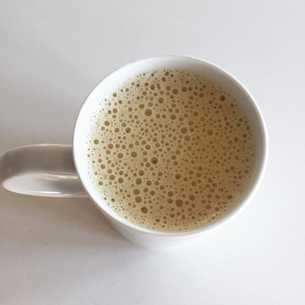 Bulletproof Coffee is made by blending a tablespoon of butter and a tablespoon of MCT oil or coconut oil into coffee Bulletproof Coffee is made by blending a tablespoon of butter and a tablespoon of MCT oil or coconut oil into coffee I previously suggested that we should not fear dietary fat. It appears that dietary fat of all types has gotten a bad rap, especially saturated fat. People are sometimes reluctant to increase dietary fat however, because they have heard for decades that "fat was bad," and that they should eat a high-carbohydrate diet for health. I believe the science is gradually correcting itself, and the case against fat is being challenged throughout the world. Occasionally, I will be discussing nutrition with someone and they proudly tell me how they have gotten over their fear of eating fat. I have lost track of how many times I have heard, "I'm drinking bulletproof coffee!" but then they question why their hunger has not decreased, and they have not lost any weight. At this point I ask them to take me through a typical day of eating. I am often surprised to hear that while they have increased their dietary fat intake, they have not also reduced their carbohydrate intake. It seems the "healthiness" of whole grains has been imprinted into our minds. I do not believe you will achieve health benefits from adding dietary fat to a high-carbohydrate diet. In fact, this will likely be counter-productive. Our goal needs to be reducing our bodies production of insulin. This occurs when carbohydrate intake is reduced. Dietary fat causes minimal to no insulin stimulation, and thus substituting fat for carbohydrates is the goal. We should not be simply adding fat to a high-carbohydrate diet. The most important part of the diet I advocate, and follow myself, is reducing carbohdrates. When following a properly formulated low-carbohydrate, high-fat diet your hunger will naturally decrease, cravings will subside, and it becomes easy to skip meals. If you attempt this kind of dietary change, and within a few days or weeks you have not noticed these changes, please carefully evaluate your food choices and make sure you are truly eating low carb. Some foods commonly felt to be healthy but contain high levels of carbohydrates include oatmeal, whole grain bread and beans. These foods must be skipped if your goal is to reduce carbohydrate intake. If there are foods you are unsure of, please ask me about them in the comment section below and I will be happy to reply with my recommendations.
1 Comment
Ann
7/3/2017 12:06:06 am
As someone with a metabolic disorder (insulin resistance) I totally know this feeling. Moving from San Francisco to Oklahoma changed my body for the worse. I had a car accident in mid 2013, after full recovery from a 2010 slip and fall and in 1 month I gained 25lbs. Next month 8lbs. Then I moved to OK and over a couple years another 25lbs. It had a lot to do with carbs. Not all carbs are bad but they are not really all needed and people are so hung up on them over protein that you just end up eating horrible bad even when you assume you aren't. I had to do a massive overhaul on my diet. It is a hard change but I miss the days after my recovery when I was working out 2hrs a day 5x a week and loving it. No pain, eating well, no meds, and happy. Thanks for posting this. It keeps the mind focused on the body's needs.
Reply
Your comment will be posted after it is approved.
Leave a Reply. |
Dr. GorczynskiOrthopedic Surgeon focused on the entire patient, not just a single joint. Categories
All
|

 RSS Feed
RSS Feed